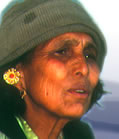THEMES IN THIS
TESTIMONY
Agriculture

Education

Environment

Health

Identity

Click on arrows
to find more
testimonies
featuring
these themes
|
|
Sex
|
male
|
|
|
Age
|
43
|
|
|
Identity
|
Magar caste
|
|
|
Occupation
|
VDC ward chairman/farmer
|
|
|
Location
|
Dandajheri VDC, Nawalparasi
|
|
|
Date
|
1994
|
|
summary
This interview focuses on environmental deterioration, especially deforestation. To survive, villagers must clear jungle for cultivation which ultimately results in the loss of fertile soil: “In our grandparents’ time, there would be sufficient soil. Now, there is stone layer everywhere”. The hillsides are too steep to keep animals, so most villagers don't. Other than trying to cultivate the land from the jungle, the most important source of livelihood is through ginger powder production, and marketing of oranges – “only this has supported Ramkot”. However, the ginger needs to be processed at a high heat and since wood is used to create the heat it leads to further deforestation. The narrator laments the continuing deforestation, saying the situation cannot go on forever: “the jungle will not be enough”. No new trees are being planted. The narrator fears for his children’s generation – “what will they do, what will they eat?”
The translation of this interview is awkward in parts.
detailed breakdown
|
You will need a password from Panos to view the full
transcript of the interview. To apply for a password, click here.
Once you have a password, click here to go to the beginning
of the transcript. You can also click on any section of the
breakdown of content below and go straight to the
corresponding part of the transcript.
|
| Section 2-3 |
He married a woman of the same caste, according to the tradition of "escaping”, which is contrasted with the more modern custom of "giving”. Little has changed in marriage customs apart from the rising cost of providing the meat, rice and wine for the wedding feast, which lasts up to three days and includes animal sacrifices. Dowry – cooking pots, animals, etc – is given only by those who can afford it.
|
| Section 4 |
His two daughters are illiterate, while two sons have had some schooling and, like himself, can read a little. Grandparents left previous home (Bojna) because of TB and cholera.
|
| Section 5 |
Others survive by growing oranges or carrying them (to markets?), but oranges are prone to disease. Each of Ramkot's 16 houses has orange trees.
|
| Section 6 |
Ginger is another important source of income, though it too is prone to disease. "JTA" (?) urged use of medicine (pesticides?), which everyone used, but to no avail.
Leaves collected from jungle, dried and bundled and used as fertiliser. Everyone collects from anywhere - no "ownership” of leaves from the jungle.
|
| Section 7-8 |
After ginger is dug up, the best is reserved for seed and excess is made into ginger powder. More profitable this way, because porter charges have become expensive and, by bulk, ginger powder fetches more than ginger. Making the powder involves drying ginger over high heat. Fire-curing favoured because other methods are less profitable, e.g., sun-dried powder sells for less than half as much.
|
| Section 9-10 |
People now fear the fires that spread beyond the cleared area to the surrounding jungle. And people are injured while clearing jungle: "We have to fight with such jungle." But it must be done, because soil has deteriorated in their fields. Land owned by those who clear it; ownership indicated by stones, etc.
|
| Section 10-11 |
The jungle is cleared, then left fallow for three years, then new jungle growth is burned and "the ashes become manure". Every family cultivates some cleared land. No communal ownership of land, but all villagers will give some to those who have less.
Slightly more literacy in village, but people still "uneducated”.
In response to interviewer's prompting, says cash crops could improve villagers' lives and save the jungle, but markets and transport need to be available. Villagers urgently need cows, buffalo, goats for their manure, and pigs to sacrifice at festivals and wedding feasts.
Houses built close together at Ramkot, according to traditional settlement pattern, but disadvantages include quick spread of fire, and arguments over neighbours' animals.
|
|


